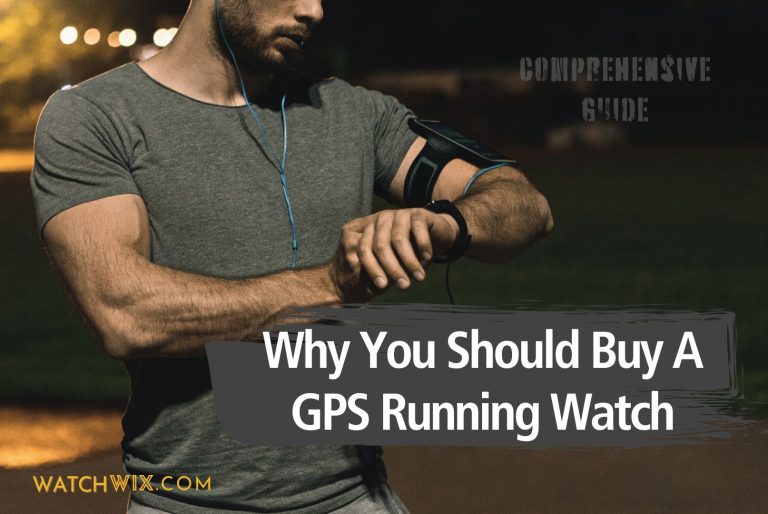Why do I need a GPS Watch for Running? Comprehensive Guide
We are in a world where technology continues to revolutionize the way we approach fitness and outdoor activities. The wristwatch has undergone a remarkable transformation. In the good old days, a watch was merely a timekeeping device. But today, it is your most trusted companion in the pursuit of your running goals.
If you’re a dedicated runner or someone considering taking up this invigorating hobby, you might be wondering, “Why do I need a GPS watch for running?” In this WatchWIX post, we have gone deep into the practical reasons why a GPS watch can be an indispensable tool for runners of all levels.
Why Are You Running?
It’s good to know why exactly we are running. People choose running as a hobby for a variety of reasons, and it offers several benefits that make it an appealing hobby. Below are some reasons why I think running is beneficial for me,
- Physical Fitness: Running is an excellent way to improve cardiovascular health, strengthen muscles, and maintain a healthy weight. It helps burn calories, build endurance, and improve overall physical fitness.
- Mental Health: Running can have a positive impact on mental well-being. It releases endorphins, which can reduce stress and boost mood. Many runners find it to be a meditative activity, providing a mental break and a sense of accomplishment.
- Convenience: Running is a simple sport that requires minimal equipment. You can do it virtually anywhere, making it accessible and convenient as a hobby.
- Social Connection: Many people find a sense of community and social connection through running clubs or events. It’s a way to meet like-minded individuals and share experiences.
- Challenges and Goals: Running allows individuals to set and achieve personal goals, whether it’s completing a certain distance, improving their pace, or participating in organized races. Achieving these goals can be highly rewarding.
- Exploration: Running provides an opportunity to explore new places. Whether you’re running through a city, on trails, or in nature, it’s a way to see the world from a different perspective.
- Time for Reflection: Running offers a chance to think, reflect, and be alone with one’s thoughts. This can be therapeutic for some individuals.
- Improved Discipline: It can help build discipline and a routine. Consistency in running can spill over into other aspects of life, fostering discipline and time management skills.
- Competitiveness: Some people enjoy the competitive aspect of running, whether they’re competing in races, against their records, or friends.
- Longevity and Health Benefits: Regular running has been linked to longevity and a reduced risk of various health conditions, including heart disease, diabetes, and certain cancers.
What Does a GPS Running Watch Do?
A GPS running watch is a wearable device that uses the Global Positioning System (GPS) to track your location, distance, and pace while you run. It can also track other metrics, such as heart rate, cadence, and elevation gain. GPS running watches are designed to help us improve our running performance and track their progress over time.
Here are some of the specific things that a GPS-running watch can do for us,
- Track distance, pace, and time: This is the most basic function of a GPS running watch, and it’s essential for tracking your progress and improvement over time.
- Track the route: GPS running watches can record your running route, so you can see where you’ve been and how far you’ve run. This can help plan new routes or track your progress on a specific route.
- Track heart rate: Heart rate is a key metric for tracking your fitness level and performance. GPS running watches can track your heart rate throughout your run, so you can see how it changes and make adjustments to your pace as needed.
- Track cadence: Cadence is the number of steps you take per minute. It’s an important metric for running efficiency, and GPS running watches can track your cadence to help you improve your running form.
- Track the elevation gain: Elevation gain is a key metric for trail runners and other athletes who train in hilly terrain. GPS running watches can track your elevation gain to help you track your progress and avoid overexertion
In addition to these basic features, many GPS running watches also offer more advanced features like,
- Training plans: Some GPS running watches come with pre-loaded training plans that can help you train for a specific race or event.
- Music storage: Some GPS running watches have built-in music storage, so you can listen to music while you run without having to carry your phone.
- Smartwatch features: Some GPS running watches also offer smartwatch features, such as notifications, weather reports, and calendar alerts.
Whether you’re a beginner runner or a seasoned pro, a GPS running watch can be a valuable tool for helping you improve your performance and track your progress.
How can a GPS Watch Benefit My Running?
A GPS watch can benefit your running in numerous ways. It helps to enhance your training, performance, and overall running experience. Here are some of the key advantages,
- Accurate Distance and Pace Tracking: GPS watches provide precise data on the distance you’ve covered and your running pace. This information is invaluable for monitoring your progress, setting goals, and ensuring you maintain a consistent pace during workouts.
- Route Mapping: GPS watches allow you to map and save your running routes. This is particularly useful for exploring new areas, ensuring you don’t get lost, and revisiting favorite routes.
- Real-Time Data: You receive real-time data while running, including your current pace, distance, and sometimes heart rate. This information helps you make immediate adjustments to your workout if needed.
- Goal Setting: GPS watches enable you to set specific running goals, such as distance, time, or pace targets. You can monitor your progress toward these goals, providing motivation and a sense of accomplishment when you achieve them.
- Training Analysis: Many GPS watches offer data analysis features. You can review your performance over time, identifying trends, strengths, and areas for improvement. This information is invaluable for fine-tuning your training program.
- Heart Rate Monitoring: Some GPS watches come with built-in heart rate monitors or are compatible with chest straps. Monitoring your heart rate helps you gauge the intensity of your workouts and can contribute to more effective training.
- Calorie Tracking: GPS watches can estimate the number of calories burned during a run, which can be useful for those looking to manage their weight or understand the energy expenditure of their workouts.
- Workout Variety: GPS watches often have workout modes for various activities beyond running, such as cycling, swimming, or even indoor exercises. This versatility makes them a valuable tool for cross-training.
- Motivation and Accountability: Tracking your runs and seeing your progress can provide a significant motivational boost. Many GPS watches also offer features like virtual competitions or challenges with friends, creating a sense of accountability and fun.
- Safety: Some GPS watches include safety features, such as emergency assistance notifications or location sharing with trusted contacts, ensuring your well-being during solo runs.
- Weather Information: Some advanced GPS watches provide weather updates, helping you plan your runs according to current conditions.
- Sleep and Recovery Tracking: Certain GPS watches offer sleep tracking and recovery metrics, which can help you optimize your rest and ensure you’re adequately recovering from your workouts.
A GPS watch is useful for you by providing accurate and real-time data, helping you set and achieve goals, optimizing your training, and enhancing your overall running experience. These benefits will usually apply to you whether you’re a beginner looking to start on the right foot or a seasoned runner aiming to reach new heights.
Do You Need a GPS Watch to Run?
My personal opinion is “No”, you do not really need a GPS watch to run. You can run perfectly well without one. But the point I need to make is that a GPS watch can be a valuable tool for runners of all levels. It can help you to track your progress, improve your performance, and stay motivated as described below.
Using a GPS watch for running offers many good benefits. One of the most notable advantages is its precise distance and pace tracking. You can accurately gauge your progress, adjust your pace to meet your goals, and ensure you’re consistently challenging yourself with this data at your fingertips.
Another key advantage of GPS watches is route mapping. You can explore new running routes confidently, ensuring you don’t get lost, while also saving and revisiting favorite paths. This not only adds variety to your runs but also keeps them engaging and exciting. Also, GPS watches facilitate goal setting and monitoring. You can set specific targets for your runs, whether it’s distance, time, or pace-related, and watch your progress unfold.
The comprehensive data analysis capabilities of GPS watches offer an insightful look into your running performance. You can track trends, strengths, and areas for improvement over time, aiding in the fine-tuning of your training program. Many GPS watches come with built-in monitors or are compatible with chest straps. This feature enables you to ensure your workouts are at the right level of intensity, optimizing your training and helping to prevent overexertion.
Beyond the physical benefits, GPS watches offer a psychological boost. Seeing your progress and reaching milestones can be incredibly motivating. Features like virtual competitions or challenges with friends add an element of accountability and fun to your runs.
Safety is another significant advantage; some GPS watches have emergency assistance notifications and location sharing with trusted contacts, ensuring peace of mind during solo runs.
Finally, sleep and recovery tracking, available in some advanced GPS watches, contributes to overall well-being by helping you optimize your rest and recovery, ensuring you’re in the best shape for your next run.
If you are a serious runner, a GPS watch can be a valuable tool for helping you improve your performance and track your progress. However, if you are just starting, you may not need all of the features that a GPS watch offers. There are many free and paid running apps available for your smartphone that can track your distance, pace, and time.
You can clearly understand with this explanation, that you don’t really need a GPS watch for running. You can run and do your training without using this. But if you use this tool, it can provide many benefits for you as described above.
Features and their usefulness of a GPS Running Watch
Below are some key features of a GPS Running Watch and their usefulness for you to make a better-informed decision to buy one or not.
| GPS Running Watch Feature | Usefulness |
| Distance tracking: Tracks the total distance you have run. | This is a basic feature that is essential for tracking your progress and improvement over time. |
| Pace tracking: Tracks your average pace per mile/kilometer. | This is another important metric for tracking your progress and improvement. It can also be used to help you maintain a consistent pace during your runs. |
| Time tracking: Tracks the total time you have spent running. | This is useful for tracking the duration of your runs and for tracking your overall fitness level. |
| Route tracking: Tracks the route you have taken. | This can be helpful for planning new routes or for tracking your progress on a specific route. |
| Heart rate tracking: Tracks your heart rate throughout your run. | Heart rate is a key metric for tracking your fitness level and performance. Tracking your heart rate can help you to avoid overexertion and to ensure that you are training at the right intensity. |
| Cadence tracking: Tracks the number of steps you take per minute. | Cadence is an important metric for running efficiency. Tracking your cadence can help you to improve your running form and to avoid injuries. |
| Elevation gain tracking: Tracks the total elevation gain you have experienced during your run. | This is a key metric for trail runners and other athletes who train in hilly terrain. Tracking your elevation gain can help you to track your progress and to avoid overexertion. |
| Training plans: Pre-loaded training plans that can help you train for a specific race or event. | Training plans can help you to stay on track and to ensure that you are training at the right intensity. |
| Music storage: Built-in music storage so you can listen to music while you run without having to carry your phone. | This can be helpful for avoiding distractions and for keeping you motivated during your runs. |
| Smartwatch features: Notifications, weather reports, and calendar alerts. | Smartwatch features can be helpful for staying connected and informed while you are on the go. |
Also, you can read the below WatchWIX articles to understand what are the best GPS Running Watches available for the budget range you need,
Best GPS Running Watches Below $400,
Best GPS Running Watches Between Price Range of $400 to $900,
Running with a Phone vs. GPS Watch
| Feature | Phone | GPS Watch |
| Accuracy | Can be accurate, but can also be affected by signal strength and other factors. | Generally more accurate than phones, especially in areas with poor signal strength. |
| Battery life | Battery life can be short, especially if you are using GPS and other features. | Typically has a longer battery life than phones, especially if you are only using GPS tracking. |
| Convenience | Can be bulky to carry, and you need to have a pocket or armband to carry it in. | Lightweight and comfortable to wear on your wrist. |
| Features | Can have a wide range of features, including GPS tracking, music storage, and smartwatch features. | Typically has fewer features than phones, but is focused on GPS tracking and running metrics. |
| Price | Can range in price from free to hundreds of dollars. | Typically more expensive than phones, but can be worth it for serious runners. |
Running with a phone and running with a GPS watch each have their distinct advantages and disadvantages. My point of view on this is provided below,
Running with a phone offers convenience and multi-functionality. Most people already carry their phones, making it easy to track runs using various apps. Phones also provide music and the ability to make emergency calls if needed. However, they can be cumbersome to carry, especially on long runs, and the accuracy of GPS tracking can vary depending on the phone’s quality and signal strength. Additionally, using a phone can be distracting, with notifications interrupting your focus.
On the other hand, a GPS watch is purpose-built for running and offers several advantages. These watches are lightweight and designed for comfort, reducing the inconvenience of carrying a phone. The GPS accuracy is typically superior, providing precise data on distance and pace. GPS watches are also equipped with features like heart rate monitoring and specialized running metrics, offering valuable insights into your performance and training. They often have long battery life, ensuring they last throughout even the most extended runs. However, GPS watches lack the multitasking capabilities of a phone. That means you’ll need to carry both devices if you want to listen to music or stay connected while running.
How Does a GPS watch work without the Internet?
A GPS watch operates independently of the internet by harnessing signals from a network of orbiting satellites, part of the Global Positioning System (GPS). This watch establishes a connection with these satellites to determine your exact location when you initiate your GPS watch. These satellites transmit precise timing and location information signals.
The watch’s GPS receiver, a specialized chip, receives signals from at least four of these satellites and uses a process called trilateration to calculate your position on Earth. The watch accurately computes its latitude, longitude, and elevation by analyzing the time it takes for each signal to reach the watch and the known locations of the satellites.
Importantly, this entire process occurs without the need for an internet connection. The watch calculates your position based on the timing of signals and known satellite locations.
The GPS watch may also include onboard maps stored in its memory, allowing it to visually represent your location on its screen without internet dependency. The watch continues to receive and interpret signals from the satellites, tracking your movements in real time as you embark on your run or activity.
Data such as your route, speed, and elevation changes are logged in the watch’s internal memory, enabling you to review your performance after your activity. This ability to function without internet access makes GPS watches highly dependable tools for outdoor activities in remote areas or locations where an internet connection is unavailable.





